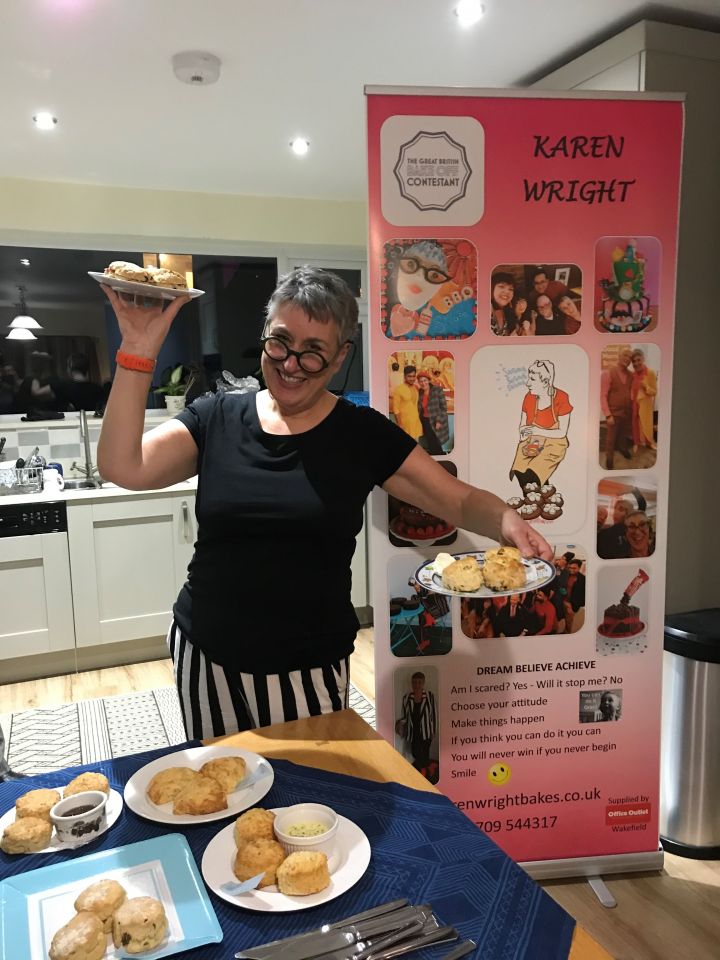Horbury and Ossett NWR recently welcomed 2018 Great British Bake-Off Contestant Karen Wright to a special meeting.
We were delighted to welcome Karen Wright, contestant in this year’s Great British Bake-Off to our recent meeting. Karen grew up not far away in Featherstone, West Yorkshire. Her entertaining talk came about thanks to a family connection and with the series aired and winner announced she was now able to speak freely.
Karen describes herself as a self-taught baker and stalker of French patisserie window displays. From the thousands who applied Karen really didn’t expect to get selected for the final twelve. She gave us an insight into the application process. The first stage was a lengthy form with questions about baking experience, including everything from hot water crust pastry to bread. She set about teaching herself to do those things she couldn’t do. After sending in the application a researcher rang for a lengthy chat, including technical questions about baking. This lead to a regional selection day. For this Karen had to make two things in advance. It was for this she realised that you needed to go in with confidence regardless of nerves underneath. After all they were looking for a mix of people who could bake and appear on television. A few days later she heard she had been chosen for a further selection day in London. It was on the train to London that she first recognised Kim Joy from the earlier regional selection. In the end Yorkshire was well represented in the programme.
Once selected contestants received lots of information on what would be required at each stage of filming. This gave them time to practice ideas. Filming took place on two long intensive days over weekends during the summer. All the contestants were excited to meet up and finally get into the tent for the first time. The tent is actually full of film crews following each contestant. Two days filming is all edited down to an hour’s programme.
What was perhaps most inspiring was how Karen had seen it as a personal challenge, showing her that she could achieve much more than she imagined. She brought along her designs and photos of her cakes showing us her innate creativity. Karen is not sure where it will all lead, but she is already in demand for talks and demonstrations locally and has set up her own website. She will be appearing next year at the well-known Wakefield Rhubarb Festival in February. She is more than anything keen to inspire others young and old to try something new. Maybe we all need to follow her lead and pick a personal challenge for 2019 and reach outside our comfort zone!
We had decided in advance that those who wanted would be asked to make three scones to a recipe of our choosing. Our competition for the evening was not against the clock, but there was still a bit of pressure to come up with presentable scones for the evening. We had a good selection of both savoury and sweet ones and it showed how creative you can be, even with the humble scone. Karen was happy to judge our efforts.
Our member Thérése Manship was the winner. Here’s her winning recipe:
Christmas Scones
· 2 medium eggs
· 1 tsp vanilla extract
· 500g (18oz) plain flour
· 25g (1oz) baking power
· 75g (3oz) golden caster sugar
· finely grated zest of 1 orange
· finely grated zest of 1 lemon
· 125g (4 ½ oz) unsalted butter chilled and diced
· 200g mixed fruit
· Buttermilk, see recipe.
1. Whisk the eggs with the vanilla in a small bowl. Sift the flour and baking powder into the bowl of a food processor and add the sugar and zest. Add the butter and whiz to crumbs, then add the egg mixture and just enough buttermilk to bring the mixture together. Transfer to a large bowl and mix in the dried fruit. You can always add a little more buttermilk if the mixture appears dry and crumbly, but take care not to overdo it otherwise the scones will spread.
2. Roll the dough out 2cm (¾ in) thick on a lightly floured worksurface and cut out scones using a 6.5 cm (2 ¾ in) cutter. Space well apart on one or two non-stick baking sheets and leave to rest for 20 minutes.
3. Heat the oven to 200C/180C fan/gas 6, then brush the top of the scones with milk and bake for 17-22 minutes until golden (the lower tray may take a little longer than the top).
The runner-up Angela Beardshall made cheese, pumpkin and poppy seeds scones with a rhubarb and ginger chutney.
We’d like to thank Karen for a most entertaining night!
You can find out more about Karen and future events, or contact her via her website: www.karenwrightbakes.co.uk
You can also follow her on Instagram or Twitter @karenwrightbake

